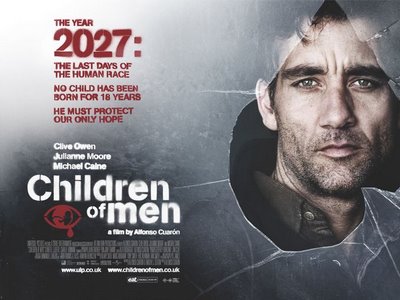 Despite of my trepidation, I found CHILDREN OF MEN to be a fairly
effective dystopian tale of the near future. The film stars a
haggard Clive Owen as Theo Faron, a cog in the bureaucrat wheel of
a United Kingdom that's tearing itself apart in the wake of a
global infertility crisis. Over seventeen years have passed since
a woman has successfully conceived a child. The world is in
shambles as a reaction to the futility of a future without progeny
and England portrays itself as the last bastion of civilization.
Yet, not all is hunky-dory in old Blighty.
Despite of my trepidation, I found CHILDREN OF MEN to be a fairly
effective dystopian tale of the near future. The film stars a
haggard Clive Owen as Theo Faron, a cog in the bureaucrat wheel of
a United Kingdom that's tearing itself apart in the wake of a
global infertility crisis. Over seventeen years have passed since
a woman has successfully conceived a child. The world is in
shambles as a reaction to the futility of a future without progeny
and England portrays itself as the last bastion of civilization.
Yet, not all is hunky-dory in old Blighty.Faron fills the void once held the child he lost years before with alcohol. His ex-wife, Julian (Julianne Moore), fills it with social activism. She's the leader of the Fishes, a radical group who spout all-too-familiar rhetoric about "the revolution." They chomp at the bit at Britain's ineffectual response to the global crisis and the government's pitiless program of immigrant deportation. But, like most holier-than-thou activists, there's little agreement as to what they can do to about their displeasure coupled with ruthless infighting amongst the group.
Julian goes to Faron with an offer of five thousand pounds in exchange for his help getting official papers for an illegal immigrant (called "Fugees" in the film's parlance) from his cousin, Nigel (Danny Huston), a government bigwig. The immigrant needing help, Kee (a strong performance from Claire-Hope Ashitey) might be the "key" to the future.
Nigel gets short shrift in CHILDREN OF MEN. In P. D. James's original novel, Nigel is his cousin's antagonist. He desperately seeks out the "Kee character" (a combination of the film's Julian and Kee) in order to save his flagging political career. This shift from book to film is typical of the smart decisions made in the adaptation of James's work. The story moves with much more purpose and direction on screen than it did on paper with the only possible item lacking being the upper-crust's disillusioned reaction to the infertility crisis with the creepy baby doll birthday parties and anthropomorphized pets.
Rather than being a fantastical post-apocalyptic tale, CHILDREN OF MEN portrays what could happen with just a nudge from any kind of crisis. The seeds have already been planted. Bombs already go off in streets. Immigrants are already openly despised. Islam is equated with abhorrent radicalism. Idealists already are short-sighted. One of the other clever ideas is to not pin down the exact cause of the infertility. No one in the movie knows. It could be the plumes of smoke and pollution that fill the air, it could be gamma rays, it could be the wrath of some unnamed diety, it could be a food-borne disease, or it could be one of any number of other factors.
 The soundtrack to CHILDREN OF MEN is particularly interesting. It's highly British and references the "glory days" of the '60s music scene all the way up to more modern fare. That the flying pig from Pink Floyd's Animals is so prominently featured was not my first tip-off that the music in this film tells a story on a different narrative plane. I feel that this topic alone could be a pretty weighty paper for a Sophomore film student somewhere.
The soundtrack to CHILDREN OF MEN is particularly interesting. It's highly British and references the "glory days" of the '60s music scene all the way up to more modern fare. That the flying pig from Pink Floyd's Animals is so prominently featured was not my first tip-off that the music in this film tells a story on a different narrative plane. I feel that this topic alone could be a pretty weighty paper for a Sophomore film student somewhere.CHILDREN OF MEN works best during its long, harrowing single take handheld shots. Cuaron's mix of quasi-documentary style with melodrama makes for interesting viewing and the film's themes make for some good food for thought.

No comments:
Post a Comment